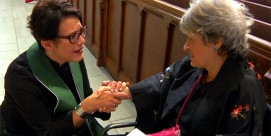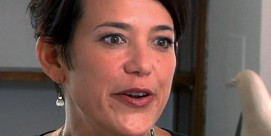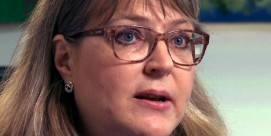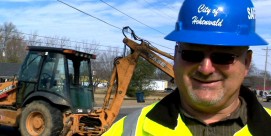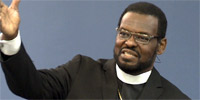In This Episode << SLIDE LEFT TO SEE ADDITIONAL SEGMENTS
Interview: Rev. Dr. Brad Braxton
Read more of Religion & Ethics NewsWeekly’s July 1, 2009 interview in New York City with Riverside Church senior minister, the Rev. Dr. Brad Braxton:
I would say it’s a time of relief, at least for me personally, to know that this moment has the potential to teach so many lessons. So it’s not relief as a “phew” because there’s so much sadness, because we came together with such great hopes….It’s more a sense of scripture teaches us, Christian theology teaches us that out of difficult moments like this so much positive can occur, so many wonderful transformations might happen. And I first want to acknowledge that there’s a sense of relief in the sense of teaching, in that this is teaching me lessons. I have learned lessons of leadership about what it might mean for me to be a clearer communicator, about how the next time I am called to leadership I do a better job of preparing people for the inevitable changes that an institution might have to go through. So I’m relieved in the sense that this moment has opportunities to teach me something, and I’m trying to be a good student, and I feel a sense of relief in that I believe the congregation if it gravitates to this moment and really stays with this moment prayerfully, it also has some wonderful wisdom to impart to the congregation.
I think what I’m going to do is to reflect, obviously, on these lessons of which I’ve been speaking and then prayerfully pursue the next phase of my ministry. My wife, daughter and I are walking in faith. The next calling has not presented itself, but this will be a time for us to be prayerful and reflective and look for the next creative opportunity to use the gifts of ministry that have been given to us to make a significant difference in some community.
I shared with the church leadership that I would be a pastoral presence as much as it is useful for me to be so, and I have received warm invitations from the congregation and the church council and other leaders to continue to lead. There are many initiatives that we have started, and the work of social justice ministry and spiritual empowerment will continue on in a fervent way even in these remaining weeks that we have. And also I will do the best that I can to outline the contours of healing. This is a community that needs some healing, and I think it would be fanciful to believe that in a matter of a few weeks or even a few months that all of us would have sorted this out. But at least we begin, we can begin to talk about this is what healing looks like, and we can fill in the data as we go along and color in the lines as we go along. But at least let’s talk about the boundaries, and we’re going to be having services, even beginning tonight, Sunday service and other services, and other opportunities to lament what happened, because first of all, before you can ever talk about healing and joy on the other side, you have to really rest for a moment with the fact that something didn’t go quite right here, and that brings pain to our hearts, and I also believe, my theology, at least, would teach me that human brokenness touches the heart of God. So there’s a lament in heaven, as well, and we need to rest with that and have ways to ritualize that spiritually, and then once we go through that process, carefully, joy can and will emerge. Hope can and will emerge. I am confident of that.
Scripture that I’ve been sharing with the congregation and the leaders is Isaiah 43. It’s a wonderful passage where God says when you go through the waters, when you go through the fire, I will be with you. The waters, the rivers, they won’t overwhelm you. The fire will not burn you. I think moments like this have the possibility to create despair. But the promise of God is even in what seems to be the most desperate circumstances, my presence will be there to undergird you, and I will be there to walk beside you, and most of all I’m going ahead of you to lead you. And that’s what speaks to me personally. I think that speaks to my family, and from the body language and comments of leaders and members of this congregation, that passage and the promise of that passage has spoken to them as well. So, Isaiah 43 has become a touchstone for many of us in the last 48 to 72 hours.
For me, the awareness began to take the form of what is really my assignment here. I would like to say, maybe this will be helpful when the congregation hears me say it in a more public way, that I have absolutely no doubt in my mind that I was called to serve as pastor of this congregation. There were too many divine signs along the way. It was a very elaborate search process. The church searched for the better part of a year and engaged a search firm, and there was an eight-day confirmation process…so that notion of a real prayerful, reflective process where we said the goals of the congregation and my gifts of ministry seem to be in line with one another. So I have no sense of despair about the fact that I was called. This was not a mishap in any way, shape, or form, at least in my perspective. There is absolutely no regret at all. The lessons that I have learned and the love that I have received have blessed me and my family in some wonderful ways. But there was a growing awareness that maybe my assignment, my calling, was not what I thought it was to be. Now, it’s a very complex process of sorting through the providence of God, more than we could ever do in one interview. But I began to realize that maybe my thinking that I was here for 10 or 15 year pastoring missed something, or I had not really latched on exactly to what God’s assignment was for me here, and one of the assignments was to clarify with greater intensity some of the unresolved issues here in the life of this congregation, issues that may hamper any senior minister from working collaboratively with this congregation. And when those issues are sorted out lovingly, the possibility of this place reaching its fullest potential is right there. It’s right there in the offing. But the congregation will have to reach, stretch, to get it. But it’s there. So maybe my assignment was to highlight that possibility that comes from addressing those internal challenges and not, and there was something in this experience that God wanted to use to teach me. I have learned some profound lessons about leadership and about patience and about standing firm in the midst of the storm that I believe God will use in the years to come. I will share this thought. Years ago when I first met Dr. [James] Forbes, I came here to preach a service for the New York Presbytery. Dr. Forbes came. It was one of the first times he and I had ever really sat down. He took me on a tour of the church, took me in his office, the office that I now occupy, and he began to theologize and he said, “God is an economical God.” That thought has stayed with me for years. That is to say that God does not waste experience. There are things that have happened that I have pledged to God I will not let that become waste. You have used the blessing of this experience, and you’ve used the burden of this experience, and all of it can work for my good, and I want in these few remaining weeks to invite the congregation to consider that same paradigm, that the blessing and the burden of all of this, none of this is waste. God has a way of turning it all into something profound. If you want to talk about current parlance around being green, God is the ultimate agent of green. Nothing is wasted in God’s universe, and I think God wants to use this and perhaps recycle some of these experiences for the greater good, I hope, for the congregation and for the greater good of my forthcoming ministry.
I think it would really be a misapprehension of the circumstance to try to say it’s one thing. Riverside Church is an incredibly diverse and complex community, and with that diversity and complexity comes an assemblage of opportunities and challenges. So let me quickly try to identify some of the challenges I’ve been sharing with the leaders that I believe if grappled with can lead to opportunities. I think some serious conversations need to occur about more creative and healthy ways of dealing with conflict and dissent. Related to that is a larger issue, and perhaps this is one of the issues that the friends we have in the neighborhood at some of the other institutions might help us think through, and that is what is the relationship between rights, as an individual’s rights in a liberal progressive institution like Riverside, and communal accountability. To be sure, each of us brings rights. We value the democratic process here. The liberal progressive tradition is born out of a sense of protecting the rights of those who have been disenfranchised and marginalized. But we also must realize that there are times when I may have to momentarily set my individual rights aside in order to find common ground for the common good. So there’s a tension that needs to be wrestled with between rights and accountability, and that’s not just, I think, an issue at the Riverside Church. I think that’s something that’s endemic to many progressive institutions. I would also say that some serious conversation needs to occur about what it means to invite a leader, a pastoral leader, into this community. Is this congregation really ready for and interested in a pastoral leader who actually wants to lead? Not autocratically. Certainly collaboratively, but lead, and that’s something that I think will need to be grappled with. How is power dispersed and shared so that you can honor the congregational style? I think it is a misnomer that has been sometimes bandied about, even here at Riverside, that I and others have misunderstood the congregational nature of this congregation. I’ve been Baptist all my life. Baptist churches are congregational. Indeed, we sometimes forget that Riverside Church historically began as a Baptist church and continues as a Baptist church, as well as a church affiliated with United Church of Christ. So being a congregational church should not mean that you don’t make room for strong, faithful, pastoral leadership. I think that’s something I would lovingly and respectfully encourage the congregation to consider. How can you have an empowered laity and an empowered pastor? I do not believe that they are mutually exclusive.
I believe, going forward, this congregation would receive significant benefit from some significant work in clarifying terminology. So let me say just a bit more about that. I have read articles over the last few weeks as people have covered the controversy where people will say things like, again, it’s an inaccuracy, but “Dr. Braxton was trying to foist upon the congregation an evangelical approach as opposed to the intellectual approach.” You know, there’re all these terms get bandied about, as if people who do have evangelical commitments, which simply in my vantage point means people who want to take the good news of God seriously, that’s all, etymologically, being evangelical means, because of certain characterizations in the culture, evangelical means a certain demographic and a certain litmus test, religious kind of dogmas. But a church like Riverside should rise to the occasion and begin to clarify terms such that if I say, as I have, that I certainly do have evangelical commitments. I am concerned about God’s good news, but from my very first moment in this congregation I have been talking about an understanding of God’s good news that makes room for all of God’s children. So what often happens in a community that is unclear about terminology and where there is some degree of fear is that people begin to stereotype one another. So, for example, even in the coverage of my departure, you have caricature and stereotypes. This past Sunday at the Riverside Church was Pride Sunday, and I publicly on multiple occasions, including my Sunday sermon, declared myself proudly to be a heterosexual ally for lesbian, gay, bisexual, transgender and queer persons and preached a sermon about struggling for the rights and dignity of persons in that demographic and with that sexual identity. Now one would say that’s an interesting kind of evangelical, isn’t it? Or the third Sunday of May, I hosted along with the congregation an interfaith dialog where I preached a sermon from the Riverside Church asking, exhorting, calling for Christians to repent of their Christian imperialism that belief that Jesus Christ is the only way. That is so far from my theology. I have always believed that there are many ways to have a relationship with God and to be in just relationships with one another. And so I would say, well, if someone also has evangelical commitments, whatever that means, and for me it means I’m simply concerned about God’s good news, do we need to have knee-jerk reactions when we haven’t clarified terms? And Riverside Church as a cathedral has the opportunity and maybe even the responsibility in the 21st century to chart new paths and to clarify terminologies and to say all of us in some sense should be concerned about God’s good news and making room for all of God’s children at the table. That has been the fundamental message that I have preached over and over and over again. How do we genuinely appreciate diversity?
What we will attempt to do in these next few weeks is, as I mentioned, continue on with all the good work that has gone on in the various ministries of the congregation and also begin in collaboration with the church council and commissions and staff and leaders, put procedures in place and begin to look for who some of the interim leadership might be and trying to leave the house as much as we can in order and create as many opportunities for the honest sharing of emotions. As you witnessed, this is something we did in a wonderful way. We had an all-staff luncheon and church council came, and it was a great experience of the process of, again, beginning to draw the outlines of healing. And we’ll try to do that with as much earnestness and tenderness as we can in the next few weeks. My final Sunday, I believe, will be the first Sunday of August, August 2nd, and to be quite honest, on August the third I’m not exactly sure what happens other than to say my wife, Lazetta, and our daughter, Karis, and I will relocate to some other part of the United States. We have some hunches where that might be, but we’re trying to sort all that out, and we will certainly need to enmesh ourselves in a community where we can find some healing, because right now we’re kind of just trying to get through this and help the congregation and help ourselves. But we will need some time to decompress and to reflect about all that has occurred and really just rest with this for a moment. And then I’m open, I’m wide open to possibilities. I have such a deep commitment for pastoral communities and pastoral leadership and mentoring younger clergies. I’ve had a longstanding commitment to theological education. And I’m looking for something that will allow me to continue to address in creative ways the progressive social justice agenda and spiritual empowerment agenda that I came to implement here at Riverside Church. So we are walking in faith.
My words for my successor would be words from the Apostle Paul: Be steadfast, immovable, always abounding in the work of the Lord. For as much as you know that your labor is not in vain in the Lord.


